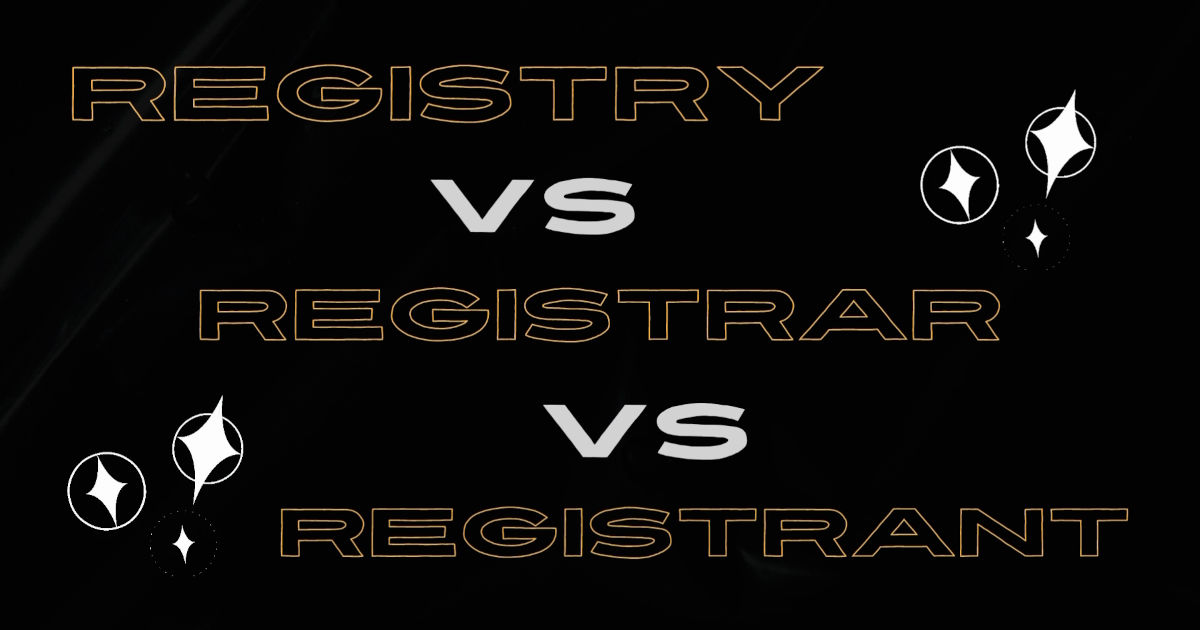Let's compare and find out the differences between a domain name registry, domain name registrar, and domain name registrant.

In the vast landscape of the internet, understanding the roles of various entities involved in managing domain names is crucial. In this article, we'll delve into the differences between a domain name registry, domain name registrar, and domain name registrant. These three terms play distinct yet interconnected roles in the domain name ecosystem.
Let's find out what is the difference between a domain name registry, domain name registrar and domain name registrant? At first, let's give the definition of those terms.
Domain Name Registry
A domain name registry or NIC (Network Information Center) is an organization that manages the top-level domain (TLD) for a given extension, such as .com, .net, or .org. The registry is responsible for maintaining the master database of all registered domain names in its TLD and ensuring that they are accessible to the rest of the internet.
Here are some of the most well-known domain registries and the top-level domains (TLDs) they are responsible for:
Verisign: Verisign is responsible for managing the .com and .net TLDs, which are two of the most popular TLDs on the internet.
Public Interest Registry (PIR): PIR manages the .org TLD, which is used by a wide range of non-profit organizations around the world.
DENIC: DENIC is another well-known domain registry that manages the .de ccTLD (country code top-level domain) for Germany.
This is just a small example. There are more than 1,500 top-level domains and hundreds of domain name registrars.
Domain Name Registrar
A domain name registrar is a company that handles the reservation of domain names as well as the assignment of IP addresses for those domain names. Registrars are the main point of contact for individuals and organizations looking to register a domain name, and they provide a range of services related to domain name management, including domain name registration, domain renewal, domain transfer, and DNS management.
Here are some examples of domain name registrars:
GoDaddy: GoDaddy is one of the largest domain registrars in the world, with over 78 million domain names under management. It offers a wide range of domain name services, including domain registration, domain transfers, and domain auctions.
Google Domains: Google Domains is a domain registrar operated by Google that offers domain registration, domain transfers, and domain management tools. It is known for its simple and user-friendly interface, as well as its competitive pricing.
NameCheap: NameCheap is a popular domain registrar that offers domain registration, domain transfers, and a variety of other domain-related services. It is known for its affordable pricing and excellent customer service.
These are just a few examples of popular domain name registrars, and there are many more out there to choose from. When selecting a domain registrar, it's important to consider factors such as pricing, customer support, and the availability of additional domain-related services.
Domain Name Registrant
A registrant is the individual or organization that registers a domain name with a registrar. The registrant is the legal owner of the domain name and has the right to use it for a specified period, typically one to ten years. Virtually anyone, even you, can become a domain name registrant. All you need to do is to purchase a domain name from one of the registrars.
Stock Market Analogy
To better understand the roles of registries, registrars, and registrants let's use the stock market analogy.
In the stock market analogy, a stock issuing company can be compared to a domain name registry. Just as a stock issuing company creates new shares of stock and maintains a record of all outstanding shares, a domain name registry creates new domain names and maintains a database of all registered domain names within a specific top-level domain (TLD), such as .com, .org, or .net.
A stock broker can be compared to a domain name registrar. Just as a stock broker acts as an intermediary between a stock issuing company and a stock buyer, a domain name registrar acts as an intermediary between a domain name registry and a domain name buyer. A domain name registrar is responsible for facilitating the registration of domain names on behalf of customers, providing customer support, and managing domain name records.
Finally, a stock buyer can be compared to a domain name registrant. Just as a stock buyer purchases shares of stock and becomes a shareholder in a company, a domain name registrant purchases a domain name and becomes the legal owner of that domain name within the TLD managed by the registry. The domain name registrant is responsible for renewing the domain name registration periodically and maintaining accurate contact information associated with the domain name.
Overall, the domain name system operates similarly to the stock market in that there are different players involved in the process, each with their own roles and responsibilities, working together to create a functioning system that allows for the buying and selling of digital assets.
Registry vs Registrar vs Registrant Cheat Sheet
Here is a cheat sheet to help you remember who the domain name registries, registrars, and registrants are.
A domain name registry is always an authoritative body. The word "registry" ends with the same letter as the word "authority".
A domain name registrar is like a stock broker. It's an intermediary between buyer and the authority. The word "registrar" ends with the same letter as the word "broker".
A domain name registrant acts as an end client. It is the broker's client. The word "registrant" ends with the same letter as the word "client".
This is how you can remember these 3 similarly sounding terms.
Hopefully, now you can much better understand who registries, registrars, and registrants are.